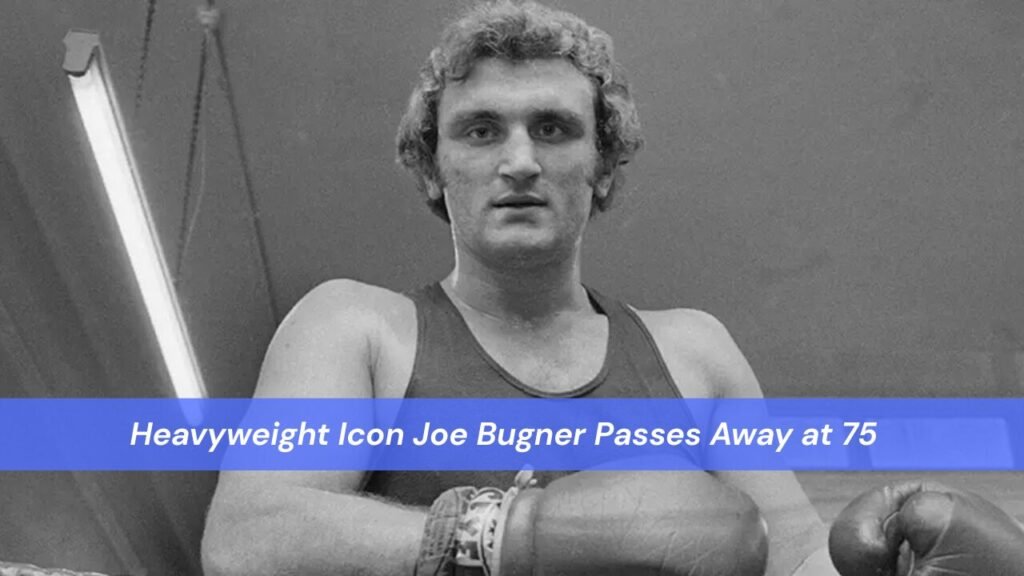Joe Bugner, the Hungarian-born heavyweight boxer who became one of Britain’s most recognizable sporting figures in the 1970s and later an Australian sporting personality, has died aged 75. His death was confirmed by the British Boxing Board of Control, marking the end of a career and life that spanned continents, decades, and countless rounds in the ring. For many fans, the news brings back memories of one of boxing’s most durable, controversial, and fascinating figures, a man who twice fought Muhammad Ali, stood toe-to-toe with Joe Frazier, and captured multiple heavyweight titles during a long and unpredictable career.
Key Takeaways
- Joe Bugner, a Hungarian-born boxer, became a prominent British and Australian sporting figure, facing legends like Muhammad Ali and Joe Frazier.
- He held British, Commonwealth, and European heavyweight titles, known for his defensive, strategic fighting style.
- Bugner’s life reflected resilience, from refugee beginnings to a long boxing career spanning over three decades.
- His influence inspired future generations of boxers and resonated with immigrants overcoming adversity.
Early Life and the Making of a Champion
Joe Bugner’s journey to boxing greatness began far from the stadium lights of London or Las Vegas. Born József Kreul Bugner on March 13, 1950, in Szőreg, Hungary, he was just six years old when his family fled their homeland following the failed 1956 Hungarian Revolution. The Bugners settled in Britain, where Joe grew up in Cambridge and quickly showed promise as an athlete. Tall, strong, and disciplined, he excelled in several sports before turning his focus to boxing as a teenager.
His early years in Britain shaped not only his identity but also his resilience. The experience of growing up as a refugee in a new country instilled in him a toughness that later became evident in his boxing career. By 17, Bugner had turned professional, debuting in 1967. His physical size standing at 6 feet 4 inches combined with his solid technical skills and defensive awareness, made him stand out in Britain’s heavyweight scene. Within a few years, he began to climb the ranks rapidly, showcasing both power and patience in the ring.
The Controversial Victory Over Henry Cooper
The moment that thrust Joe Bugner into the national spotlight came in 1971, when he faced British hero Henry Cooper for the British, Commonwealth, and European heavyweight titles. The fight went the distance, and the judges awarded a narrow points victory to Bugner. While the decision was officially correct, it proved controversial, dividing fans and media. Many supporters of Cooper felt the national favorite had done enough to retain his titles, while others praised Bugner’s precision and defensive skill.
The reaction to that fight would haunt Bugner for years. Some fans labeled him an ungrateful upstart who had dethroned a national treasure, while others admired his composure under pressure. The controversy, however, cemented his status as a headline name in British boxing. It also reflected one of the key themes of his career: Joe Bugner was respected by experts for his technique, but he was often misunderstood by the general public, who sometimes found his cautious style less exciting than that of his more aggressive contemporaries.
Climbing the World Stage: Battles with Ali and Frazier
Following his victory over Cooper, Bugner began to attract international attention. The early 1970s were a golden age for heavyweight boxing, with legends like Muhammad Ali, Joe Frazier, and George Foreman dominating headlines. Bugner, now Britain’s leading heavyweight, soon found himself sharing the ring with these giants.
In 1973, he fought Muhammad Ali for the first time in Las Vegas. Although Bugner lost on points, he earned widespread respect for going the full twelve rounds against one of the sport’s greatest ever champions. Ali, known for his charisma and sharp tongue, praised Bugner afterward, calling him one of the toughest men he had ever faced. Two years later, Bugner faced Ali again this time in Kuala Lumpur in 1975 for the world heavyweight title. Once more, Bugner went the full distance, losing on points but proving his endurance, intelligence, and ability to absorb punishment.
In between those iconic bouts, Bugner also squared off against Joe Frazier, another heavyweight legend. Although he lost to Frazier in 1973, his ability to compete with the very best in the world placed him among the elite fighters of his generation. Few heavyweights could claim to have faced both Ali and Frazier and fewer still could say they had gone the distance with both. For Bugner, those fights represented his finest moments on the global stage, even if they didn’t end in victory.
Fighting Style and Reputation
Joe Bugner’s style in the ring was often described as cool, measured, and defensive. He preferred to rely on strategy rather than brute force, using his long reach and excellent timing to frustrate opponents. This approach made him highly effective against aggressive fighters but less popular with fans who craved dramatic knockouts. In an era dominated by flamboyant personalities and explosive punchers, Bugner’s methodical approach was sometimes seen as uninspiring.
Yet his defensive mastery allowed him to enjoy an exceptionally long career. Over more than three decades, he fought 83 times, winning 69 bouts including 41 by knockout and losing only 13. That level of durability and consistency was rare among heavyweights. Bugner’s ring intelligence also kept him competitive against younger fighters well into his 40s. Unlike many boxers of his time, he managed to avoid the kind of devastating defeats that ended other careers prematurely.
A Life of Migration: From Britain to Australia
By the early 1980s, Joe Bugner had grown disillusioned with British boxing politics and public criticism. Seeking a fresh start, he relocated to Australia, where he adopted the nickname “Aussie Joe.” The move reinvigorated his career and personal life. In Australia, Bugner found both a new fanbase and renewed motivation to fight. He became a familiar figure on television and in local media, and his outspoken personality often made him a favorite for interviews and guest appearances.
In Australia, Bugner continued to box sporadically, often against younger opponents or regional contenders. Though no longer in his prime, his experience and toughness earned him victories against notable fighters, including former title challengers James Tillis and Greg Page. His longevity became part of his legend; few could match his combination of skill, resilience, and adaptability across such a long span.
Challenges Beyond the Ring
Like many athletes who spend their lives in the public eye, Joe Bugner faced personal and financial challenges after retirement. Reports over the years mentioned bankruptcy filings and business setbacks, as well as struggles with his health. In later life, he was diagnosed with dementia, a condition affecting many retired boxers due to the physical toll of the sport. Despite these hardships, Bugner remained a respected figure in the boxing community and often reflected on his career with pride rather than regret.
His family confirmed that he spent his final years in a care home in Brisbane, Australia, surrounded by close relatives. Tributes poured in from across the boxing world following the announcement of his death. The British Boxing Board of Control expressed condolences, describing Bugner as “a champion in every sense physically powerful, technically gifted, and a true professional who represented British and Commonwealth boxing with distinction.”
Legacy of Joe Bugner
Joe Bugner’s career cannot be defined solely by titles or statistics, though both are impressive. He was British, Commonwealth, and European heavyweight champion and fought many of the sport’s greatest names. What set him apart was his resilience both in and out of the ring. He fought across three decades, through changing eras and against a range of styles, adapting to each challenge with intelligence and composure.
His legacy is also deeply cultural. As a Hungarian immigrant who became a British champion and later an Australian icon, Bugner embodied the global nature of sport. He represented three identities: Hungarian by birth, British by upbringing, and Australian by choice each of which claimed a piece of his story. That journey from refugee to world title contender remains a powerful testament to perseverance.
While some fans never forgave him for beating Henry Cooper, others came to appreciate his contributions to the sport over time. Today, boxing historians and former professionals often cite him as one of the most technically underrated heavyweights of his era, a man who went toe-to-toe with Ali, Frazier, and other legends, and who did so with dignity and determination.
Joe Bugner’s Influence on Future Generations
Many younger boxers, particularly from Britain and Australia, have credited Joe Bugner as a source of inspiration. His disciplined approach to fitness and his mental resilience provided a model for longevity in a notoriously unforgiving sport. In interviews during the 1990s and 2000s, fighters such as Lennox Lewis and Frank Bruno acknowledged Bugner’s influence, noting that he had helped pave the way for future British heavyweights to be taken seriously on the world stage.
Beyond the sport itself, Bugner’s story also resonated with immigrants and refugees who saw in him a reflection of their own struggles for acceptance and success. His life was proof that talent and determination could overcome cultural barriers, prejudice, and early hardship.
Frequently Asked Questions
Who confirmed Joe Bugner’s death?
The British Boxing Board of Control confirmed the news of Joe Bugner’s passing, expressing condolences to his family and acknowledging his significant contributions to British boxing.
How many times did Joe Bugner fight Muhammad Ali?
Bugner faced Muhammad Ali twice, first in 1973 and again in 1975. Both fights went the distance, with Ali winning on points each time. Bugner’s ability to last the full distance against Ali remains one of his most respected achievements.
Did Joe Bugner ever win a world title?
Although Bugner never won a recognized world championship, he held the British, Commonwealth, and European heavyweight titles a rare triple achievement that placed him among the top heavyweights of his generation.
Where did Joe Bugner spend his final years?
He spent his later years in Brisbane, Australia, living quietly after his retirement. He passed away in a care facility after battling dementia.
What was Joe Bugner’s overall record?
Joe Bugner’s professional record includes 83 fights, 69 victories (41 by knockout), 13 defeats, and one draw a testament to his endurance and skill.
Conclusion
Joe Bugner’s life and career reflect a remarkable journey of perseverance, skill, and adaptability. From a Hungarian refugee to a British champion and Australian icon, he consistently demonstrated resilience in and out of the ring. His bouts with boxing legends and long-lasting career highlight his technical mastery and endurance. Though often misunderstood by the public, his impact on the sport remains significant. Bugner’s legacy endures as an inspiration for athletes and those overcoming personal and cultural




